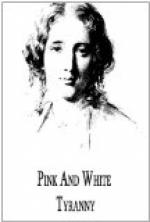Springdale had no beau monde, no fashionable circle, no Bois de Boulogne, and no beaux, to make amends for a husband’s engrossments. Grace was sisterly and kind; but what on earth had they in common to talk about? Lillie’s wardrobe was in all the freshness of bridal exuberance, and there was nothing more to be got, and so, for the moment, no stimulus in this line. But then where to wear all these fine French dresses? Lillie had been called on, and invited once to little social evening parties, through the whole round of old, respectable families that lived under the elm-arches of Springdale; and she had found it rather stupid. There was not a man to make an admirer of, except the young minister, who, after the first afternoon of seeing her, returned to his devotion to Rose Ferguson.
You know, ladies, Aesop has a pretty little fable as follows: A young man fell desperately in love with a cat, and prayed to Jupiter to change her to a woman for his sake. Jupiter was so obliging as to grant his prayer; and, behold, a soft, satin-skinned, purring, graceful woman was given into his arms.
But the legend goes on to say that, while he was delighting in her charms, she heard the sound of mice behind the wainscot, and left him forthwith to rush after her congenial prey.
Lillie had heard afar the sound of mice at Newport, and she longed to be after them once more. Had she not a prestige now as a rich young married lady? Had she not jewels and gems to show? Had she not any number of mouse-traps, in the way of ravishing toilets? She thought it all over, till she was sick with longing, and was sure that nothing but the sea-air could do her any good; and so she fell to crying, and kissing her faithful John, till she gained her end, like a veritable little cat as she was.
CHAPTER XI.
NEWPORT; OR, THE PARADISE OF NOTHING TO DO.
Behold, now, our Lillie at the height of her heart’s desire, installed in fashionable apartments at Newport, under the placid chaperonship of dear mamma, who never saw the least harm in any earthly thing her Lillie chose to do.
All the dash and flash and furbelow of upper-tendom were there; and Lillie now felt the full power and glory of being a rich, pretty, young married woman, with oceans of money to spend, and nothing on earth to do but follow the fancies of the passing hour.
This was Lillie’s highest ideal of happiness; and didn’t she enjoy it?
Wasn’t it something to flame forth in wondrous toilets in the eyes of Belle Trevors and Margy Silloway and Lottie Cavers, who were not married; and before the Simpkinses and the Tomkinses and the Jenkinses, who, last year, had said hateful things about her, and intimated that she had gone off in her looks, and was on the way to be an old maid?




